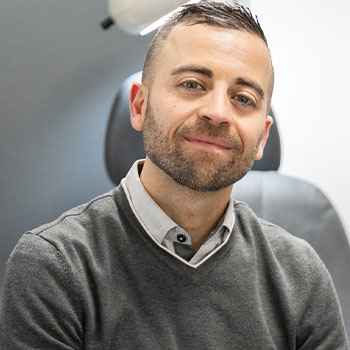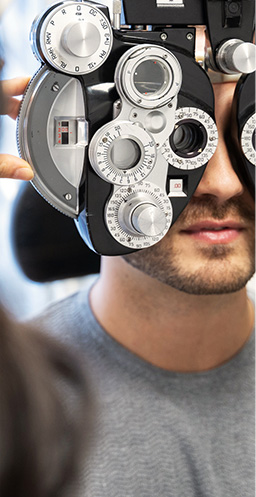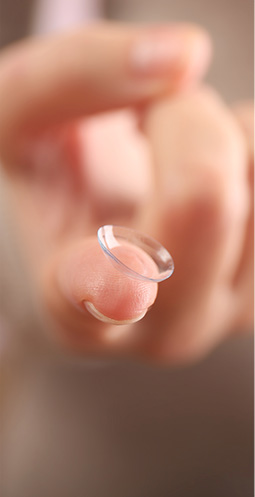What sort of process did you go through to find your optometrist? Or maybe you don’t have one yet because you’re not totally sure what the best process is to find a good one. Unfortunately, a lot of patients just go to whoever is closest to them.
And of course, that’s not to say the optometrist a few blocks from your house isn’t a good optometrist, and there’s certainly nothing wrong with trying to find a convenient solution. But it is your local eye doctor the right person to take care of your health needs? And how do you even determine that?
I believe that any medical professional should be held to the highest possible standards, and I believe our patients should have the right to hold us accountable. As a result, my team, my practice, and I are always working to be better at what we do. Over time, I’ve come to believe that there are a few traits and qualities that separate exceptional optometrists from good optometrists.
Here are some things you may want to keep in mind when determining if your eye doctor is the right one for you.
What Do You & Your Family Want From Your Eye Doctor
In order to decide whether your optometrist is right for you or not, you need to consider what the right fit for you might be. What sort of visual needs do you and your family have, and what kind of experience do you want to have with your optometrist?
Specialties
In addition to a bachelor’s degree and a Doctor of Optometry degree, most optometrists undergo some kind of residency before entering the workforce. These educational positions often include some kind of additional specialized training or experience in a certain area of optometry. For example, many optometrists focus on dry eye, diagnosing and treating eye diseases, or administering therapies like vision therapy during their residencies.
Are there any specialties that are important to you? For example, if you’re suffering from dry eye disease, a doctor with specialized experience in diagnosing and treating dry eye symptoms would probably be beneficial to you.
Areas of Interest
I imagine that some parts of your job are particularly exciting or interesting for you. Eye doctors are very much the same; most of us have a few areas about which we are very passionate. For instance, I know some optometrists who feel very strongly that proper diet and nutrition should be an important part of an eye care routine. Patients who appreciate a more holistic approach to medicine would be an excellent fit for these doctors.
Taking the time to find a doctor whose areas of interest align with yours means you are more likely to trust your optometrist (as you share similar interests and opinions) and allows the two of you to work toward your eye health goals together as a cohesive team.
Visual Needs
Your eyes are as unique as your fingerprints. As a result, your visual needs are highly personal. When determining whether your optometrist is the right fit for you, consider your visual needs.
If you have a near-sighted child, you really need to see an optometrist that offers myopia control. If you participate in combat sports, it’s a good idea to make sure your eye doctor offers vision therapy for concussions and brain injuries. If you have very stubborn dry eye symptoms, your optometrist needs to offer more treatment options than one brand of prescription eye drops.
Communication Style
Communication is crucial for any good optometrist. But communication style really depends on preference. How do you want your eye doctor to explain your results to you? Do you want them to use analogies and metaphors to help you understand what’s going on? Do you want them to just give you the most scientific explanation right off the bat? Do you want them to give you all the implications, down to the nitty-gritty? Or do you want them to give you the gist of what they’re trying to say?
It’s important that you take an active role in learning about and understanding your visual system. So think about how you absorb information and what the best way to get through to you is. Your eye doctor should be able to explain things in a way that makes sense to you. What does that look like?
Qualities Every Good Optometrist Should Have

Familiarity
Your lifestyle plays a massive role in your ocular health. Your job, your hobbies, your diet, your environment; all of these elements can impact your eyes. And it’s the type of information your optometrist should pay attention to.
Family history is another influential factor on your eye health. You probably provided at least a little bit of your family medical history when you first filled out paperwork at your current practice. But has your optometrist ever asked about it?
Of course, eye doctors see a lot of patients every day. It’s impossible to memorize every detail about every patient, which is why we have charts. But it’s the doctor’s responsibility to look at your chart and reacquaint themselves with your visual needs, struggles, and history before the appointment starts.
If you see a new optometrist and they don’t make any attempt to understand how you use your eyes on a daily basis, you may not want to come back for a second visit. If you’ve seen your optometrist several times and you still get the sense that they have no idea who you are, what you do, or what you need from them, you may want to search for more personalized care somewhere else.
Inclusivity
Sometimes, eye doctors are so focused on completing their exam flow, they start speaking at their patients rather than to their patients. But spouting medical terminology does not a good doctor make. Our job is more than just to evaluate and protect your eye health. It is our responsibility to make your eye health make sense to you so you can make fully-informed decisions.
Too often, patients leave an eye exam without feeling like they have learned anything new beyond “you need glasses” or “you don’t need glasses yet.” A good optometrist will get you involved in your own eye health so you can be proactive. For example, if I find anything important, unusual, or interesting during an examination, I’ll use the technology at my disposal to take a photo and show it to the patient.
By showing the patient what I see and explaining what it means in language they can understand, I am allowing them to be an active participant in their eye care. In my experience, patients are more likely to pursue treatment and actively maintain their eye health if they have a firm grasp on the current state of their eyes.
To put it simply: your appointment with your optometrist should not end until you feel like you understand any potential concerns with your eyes and what the implications of those potential concerns might be.
Passion
It seems obvious that someone who is passionate about what they do will perform better than someone who is miserable in their profession. But in medicine, passion does not just mean enjoying the job. It means you take an active interest in your field.
Optometry, like any medical field, is constantly evolving with new technology and scientific discoveries. A complacent optometrist will remember what they learned in school and in the first few years of their career and will be satisfied with that.
A passionate optometrist is always hungry to learn. They will invest time and money in new procedures, new technology, and new research. When your eye doctor is passionate about their work, they will use the most advanced care method available, which means a better experience for you.
Respect
At the end of the day, your eyes, your vision, and your money are on the line. A good optometrist will always prioritize your eye health. But a great optometrist will recognize that there are other elements that need to be considered as well. Your eye doctor is responsible for presenting all of your treatment options to you and helping you determine which is right for you, not telling you what to do without any discussion of the alternatives.
There is Such Thing as the “Right” Optometrist
Eye doctors range in skills, specializations, experience, and more. In order to really get the most out of your eye health, you need to be willing to consider your optometrist critically. Trust them as a medical professional, but do not be afraid to get a second opinion or find someone who’s better suited to your specific needs.
Some people spend years trying to find the right hairstylist. Doesn’t it make sense that your optometrist should stand up to at least that level of scrutiny?
Your eyes deserve more than just “good enough.” Make a point of finding the right eye doctor, and your eyes will thank you.








